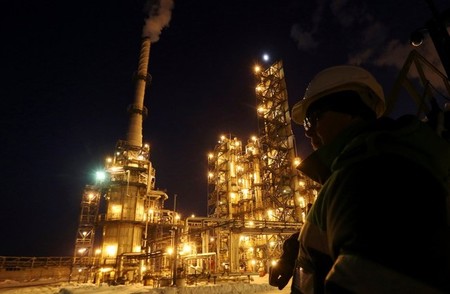Countries participating in the United Nations COP28 climate conference are considering phasing out the use of fossil fuels as part of the summit’s final agreement, according to a draft negotiating text seen on Tuesday.
Global carbon dioxide emissions from burning fossil fuels will reach record levels this year, worsening climate change and increasing extreme and destructive weather, research published Tuesday found.
A draft of what could be the final COP28 agreement published by the UN climate body begins negotiations on what is seen as the main topic of the summit: whether countries will finally agree to end the use of fossil fuels.
The draft text contains three options, which will now be considered by delegates of nearly 200 countries.
The first option in the draft is described as an “orderly and equitable phase-out of fossil fuels.” In UN parlance, “equitable” suggests that rich countries with a long history of burning fossil fuels will phase out faster than poor countries that are now developing their resources.
The second option calls for “relentlessly accelerating efforts to phase out fossil fuels.” The third option is not to mention the phase-out of fossil fuels.
The United States, the 27 European Union nations and climate-vulnerable small island nations are calling for a phase-out of fossil fuel use to dramatically reduce carbon dioxide emissions that scientists say are needed this decade to tackle catastrophic climate change to avoid.
“We are not talking about turning off the tap overnight,” said Jennifer Morgan, Germany’s climate envoy. “What you are seeing here is a real battle over the future energy system that we will build together.”
Major oil and gas producers, including Saudi Arabia and Russia, have opposed previous phase-out proposals.
The Russian Energy Ministry and the Saudi government’s communications agency did not respond to requests for comment on their positions.
Sultan Al Jaber, head of the United Nations Climate Change Conference (COP28) in the United Arab Emirates, stressed on Monday that he respects the science on climate change and said that phasing out fossil fuels is “inevitable.”
“I have repeatedly said that reducing and phasing out fossil fuels is inevitable, it is necessary,” Jaber, who is also CEO of state oil company ADNOC, told reporters.
Fossil fuel emissions are on the rise
The global carbon budget report, published on Tuesday, said carbon dioxide emissions from coal, oil and gas are still rising, especially from India and China.
The report, by scientists from more than 90 institutions including the University of Exeter, found that countries are expected to emit a total of 36.8 billion tonnes of carbon dioxide from fossil fuels in 2023, an increase of 1.1% on last year.
This year’s total global emissions, which reached a record high last year, are expected to plateau in 2023 due to slightly better land use, including reduced deforestation. Total emissions, including land use, will reach 40.9 billion tons this year.
Fossil fuel emissions rose in China after it lifted Covid-19 restrictions, while the increase in India was due to electricity demand growing faster than renewable energy capacity, forcing fossil fuels to make up the shortfall.
This year’s emissions trajectory takes the world away from preventing global warming by more than 1.5°C above pre-industrial levels.
Professor Pierre Friedlingstein from Exeter, who led the research, said: “It now seems inevitable that we will exceed the 1.5°C target in the Paris Agreement.”
“The leaders meeting at COP28 will need to agree on a rapid reduction in fossil fuel emissions even to maintain the 2 degrees Celsius target,” he said.
To get daily in-depth coverage of the UN Climate Change Conference (COP28) in your inbox, subscribe to the Reuters Sustainable Switch newsletter here.

Devoted music ninja. Zombie practitioner. Pop culture aficionado. Webaholic. Communicator. Internet nerd. Certified alcohol maven. Tv buff.

